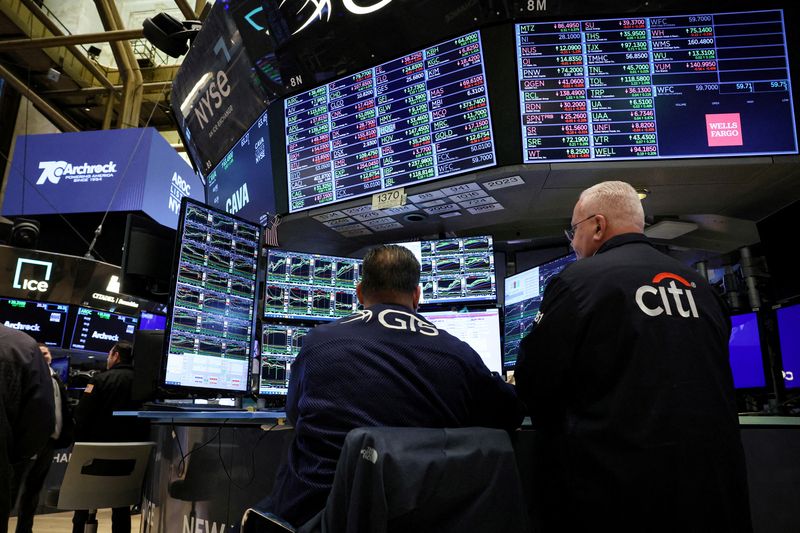By Tom Westbrook
SINGAPORE (Reuters) - A shortening of U.S. stock settlement window next week is expected to upend trading for Asian money managers, pushing some to secure funds in the early hours of their mornings when currency markets are at their thinnest and most jumpy.
From May 28, investors from Singapore, Tokyo or Seoul who buy U.S. shares during the Wall Street day will have just 24 hours to validate their trades and convert their funds into dollars to complete the deals, down from two days previously.
While the new U.S. rules are designed to reduce counterparty risks, dealers and regulators are watching to see if the changes ruffle prices or flows in the $7.5-trillion-a-day forex market.
In Asia, traders are all too familiar with the sudden moves that happen when big trades hit in low liquidity hours of their mornings, such as dives in sterling in 2016 or dollar/yen in 2019, which created global market ripples.
"That New York 5 p.m. to Tokyo, say, seven or eight, is usually what we refer to as a twilight zone," said Bart Wakabayashi, Tokyo branch manager at State Street (NYSE:STT), a custodian bank involved in settling U.S. stock trades.
"There's not a lot of clients trading at that time...(and) not a lot of banks supplying liquidity," he said.
"So if there's an imbalance, there could be an adverse impact on markets...bigger swings than traditionally."
Under the changes, the deadline for affirming trades, where brokers, investors and custodians check and agree on all the details, moves from 12.30 p.m. New York time on the day after a trade to 9 p.m. on the day of the trade, according to the Depository Trust & Clearing Corporation (DTCC), which provides clearing and settlement for U.S. securities.
That's 9 a.m. in Hong Kong and means investors there need to be available well before then to fix problems, or risk failed trades and higher processing fees.
Gerard Walsh, head of client solutions for banking and markets at Northern Trust (NASDAQ:NTRS), said tighter timetables could mean a shift in FX flows towards early opening times in Asia's financial centres.
"That's one of the many permutations that we think might happen...this needs careful attention for what could be years, until markets are in sync again," Walsh said.
MONEY MOVING
Investors and their broker-dealers have been preparing for the change by planning for increased staffing, automation, extra cash buffers and, in some cases, pre-funding trades.
Most of that adds cost, ultimately borne by the investor.
"When you do T+2 or T+1 or same day FX, the liquidity conditions can vary quite significantly based on the currency and time of day of execution, which can have an impact to the overall transaction cost," said Phillip Van Dine, head of banks and market infrastructure sales for Citi Securities Services in Asia.
Ironically, settlement risks could also rise in currency trade as a cut-off for submitting trades to CLS, a large settlement platform run by big banks, is not moving from midnight Central European Time (6 a.m. in Hong Kong).
The changes will also leave the U.S. out of step with most other currency and global stock markets, which settle in two days.
That means an investor selling, for example, an Australian stock to fund a U.S. purchase will need either a line of credit or to carefully manage cash and currency flows, since it will take two business days for the Australian dollars to arrive.
The juggling act will be even more acute over weekends or market holidays, and in markets such as South Korea where currency trading stops on holidays. Retail brokers must also position for unpredictable client demand for currencies.
"(Fund managers) can anticipate the demand beforehand and purchase dollars on Friday to have them ready," said Cho Jung-oh, digital innovation department head of Mirae Asset Global Investment.
"However, for securities firms, it's challenging to predict how much individuals will buy, making it difficult to secure dollars in advance."
To be sure, most participants welcome shorter settlement and believe uncertainties can be mitigated.
Trades that miss the CLS cut-off can still be submitted as late as 6.30 am CET, or settled outside CLS.
Singapore's central bank and other market participants noted increased morning trade should also deepen the market.
Large banks and custodians such as Citi, State Street, J.P. Morgan and BNY Mellon (NYSE:BK), among others, say they are able to automate much of the process, including foreign exchange, to ensure Asia-based investors get dollars in time.
It's also not the first time this has happened. The U.S. settlement cycle has shrunk over the years from five days in 1987, without incident. India moved smoothly to T+1 in 2023.

Still, the shift highlights some of the inflexibility in the cumbersome infrastructure that underpins global markets and moves trillions daily.
"We have a transaction bank that expects money moving 24/7 and we have a foreign exchange market that only works 5-1/2 days a week, with cut-off times," said Paul van Sint Fiet, head of cross-currency solutions for Asia at J.P. Morgan.